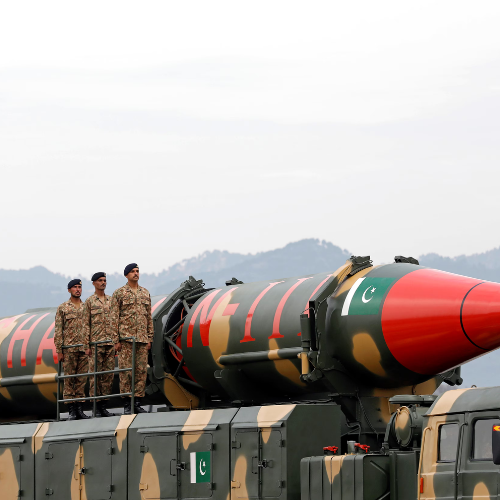The United States has taken a major step by imposing new sanctions on Pakistan, targeting the country’s long-range missile program. This includes sanctions on Pakistan’s National Development Complex (NDC) and three companies based in Karachi. These measures aim to stop the spread of dangerous weapons and technologies, including missiles that could carry nuclear warheads.
What Are the Sanctions About?
The new U.S. sanctions focus on Pakistan’s missile program, which includes the development of long-range ballistic missiles. These missiles can carry nuclear weapons, and the U.S. believes that they pose a threat to global security. The sanctions freeze any U.S. property owned by the targeted organizations and prevent American citizens or companies from doing business with them.
One of the key targets is the National Development Complex (NDC), a state-run organization in Pakistan. The NDC is responsible for creating and testing ballistic missiles, which are powerful weapons capable of reaching far distances. The U.S. says that the NDC has been trying to get parts and equipment that could help improve Pakistan’s missile program. This includes missile-testing equipment and other technologies that would make the missiles even more advanced.
Besides the NDC, the U.S. has also sanctioned three companies: Affiliates International, Akhtar and Sons Private Limited, and Rockside Enterprise. These companies are based in Karachi and have been working with the NDC to buy equipment for Pakistan’s missile program. The U.S. government says these companies are helping to spread dangerous technologies that could be used in weapons of mass destruction.
Why Are These Sanctions Important?
The United States has imposed these sanctions because it believes that Pakistan’s missile program is a threat to peace and stability in the region. Pakistan has a history of rivalry with neighboring India, and both countries have nuclear weapons. The U.S. is concerned that the development of even more powerful missiles could increase tensions in this already unstable area.
U.S. Sanctions UAE-Based Network Supporting North Korea’s Weapons Programs
Pakistan has not signed an important global agreement called the Non-Proliferation Treaty (NPT), which is designed to stop the spread of nuclear weapons. This treaty is followed by many countries, but Pakistan has refused to join it. The U.S. is worried that without such agreements, countries like Pakistan might continue to develop weapons that could be dangerous to other nations.
The Shaheen family of missiles, which are part of Pakistan’s ballistic missile program, are particularly concerning. According to experts, these missiles are capable of carrying nuclear warheads. The U.S. believes that these missiles could be used in dangerous situations and could escalate conflicts in the region.
Pakistan Responds to the Sanctions
Pakistan’s government has strongly disagreed with the U.S. sanctions. The country’s foreign ministry called the sanctions “unfortunate and biased,” saying that they would only make the situation in the region worse. Pakistan argues that the sanctions are unfair and only serve to highlight the differences between Pakistan and India, two nuclear-armed countries.
Pakistan has long had a rivalry with India, and both countries have nuclear weapons. The U.S. sanctions are seen by Pakistan as an attempt to increase the power gap between the two nations. Pakistan believes that the sanctions will not help make the region safer, but instead could make tensions rise even further.
While the U.S. is focused on limiting the spread of nuclear weapons and missiles, Pakistan sees its missile program as important for its own defense. The country believes that these missiles are necessary to protect itself from potential threats, especially from neighboring India.
The United States, however, insists that these measures are necessary for global security. The U.S. government says it will continue to take action against countries and companies that are involved in the spread of weapons of mass destruction. The sanctions are part of an ongoing effort to stop dangerous technologies from being used to create nuclear weapons and other weapons of mass destruction.


